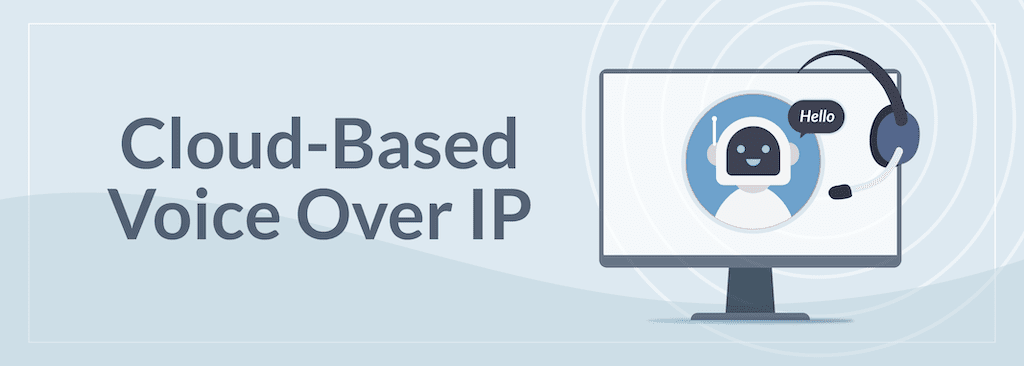What is Cloud-Based VoIP?
With a name like Voice over Internet Protocol (VoIP), it is not surprising that many do not know what VoIP is. In fact, people globally use this technology every day without even realizing it. VoIP gives the ability to use software or hardware to make calls via the internet. Every time you make a video call, you use VoIP, but it can be used for so much more.
How does it work?
While standard landlines use simple analog voice data transferred through copper wire to send communications, VoIP systems can simply transfer this data through the internet, making the old copper connections obsolete.
While the standard landline has largely been abandoned, many contact center software providers still require call centers to have hardware installed on the premises. These options generally come with large and expensive equipment that is outdated almost as soon as the installation is complete — requiring constant maintenance and upkeep that all adds additional expenses to your contact center.
Other software as a service (SaaS) providers give contact centers the ability to capitalize on VoIP systems without these added expenses through a cloud-based hosted system. Cloud-based VoIP systems, as well as various additional cloud applications, are now located in secured data centers that are easily managed and configured by vendors. When connected with the cloud, all the responsibilities that used to land on contact centers. Things such as maintenance, support, applications/services, overall infrastructure and finding a carrier service to handle daily operations are taken care of by IT specialists, as well as the cloud vendor, so your business can focus on other important areas.
What to look for in a VoIP system
- Automatic Call Distribution (ACD)
- Automatic Call Distribution is an essential tool for any VoIP system, especially those handling high call volumes. This solution helps decongest call traffic and improve first call resolution by routing calls to the appropriate departments and agents as soon as an agent is available.
- Analytics
- Advanced call center analytics provide you with valuable insights regarding your call center’s traffic, compliance risks and agent productivity. The more data you have available, the more informed decisions you can make for your contact center.
- Call flip
- Call flipping (call transferring) allows agents to transfer calls from agent to agent or to other departments that are better suited to resolve customers’ questions.
- Call queue
- Contact centers often find themselves flooded with calls throughout the year. With call queuing, you can decrease the number of missed calls and improve your customer service, especially during times of high call volumes.
- Call recording
- Quality assurance and compliance are major pain points for contact centers. Call recording lets you go back and review calls to ensure agents are providing the best quality service and remaining compliant with government regulations.
- Call whisper (agent coaching)
- Improvement is the key to success for every contact center. Supervisors can use agent coaching to discreetly join calls and provide feedback and advice to agents during a live call without the client listening.
- CRM integration
- When deciding on a VoIP system, it’s essential that you find one that seamlessly integrates with your CRM and additional call center solutions. Keeping things running smoothly on the back end is the key to having agent and customer interactions on the front end stay efficient as well.
- Interactive Voice Response (IVR)
- Utilizing an Interactive Voice Response solution is an excellent addition to your call center software and a great way to quickly serve more customers. Offering consumers ways to find information through self-serve options, especially outside of regular business hours, increases customer satisfaction and allows agents to focus on more complex issues.
Biggest benefits of VoIP
Cloud-based VoIP systems have a lot to offer contact centers to help bring them to the next level. One of the most significant benefits for any contact center is the flexibility of existing in the cloud. Instead of having limited seats and phone numbers available, contact centers can add as many numbers and seats as they want because they are not hampered by on-premise hardware and can support remote workers.
Cloud VoIP systems also improve the overall quality and efficiency of a contact center. With advancements in fiber optics and higher internet speeds, call quality is far superior to the static-filled calls of old copper connections and are less likely to drop with the much improved connections. Everyone’s favorite perk of cloud-based VoIP solutions is the affordability. Without the added costs of hardware, maintenance and applications, cloud solutions are a fraction of the cost of premise-based solutions and offer a greater return on your investment.
Request a demo to explore the opportunities available to your contact center through TCN’s cloud-based VoIP system.
